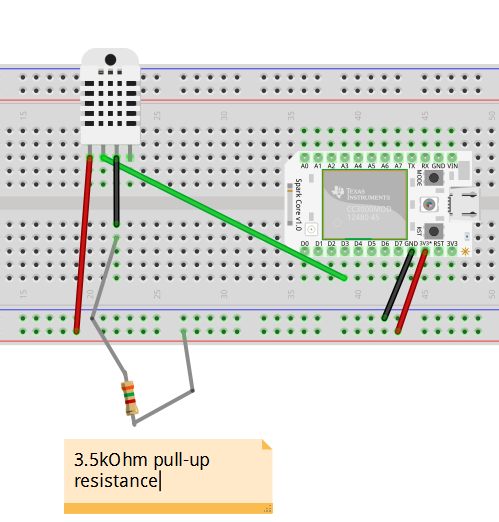Home Temperature and Humidity on your phone with Particle Photon, DHT22, IFTTT and Numerous app
##How to?
First, you need:
- Particle Photon/Core
- Wires
- One 3,5 K\Ohm Resistance
- Breadboard
- One DTH22 Temperature/Humidity sensor
- 30 minutes of time
#The circuit:

Download here the circuit design for Fritzing.
Connect you Photon/Core and go to https://build.particle.io/build Insert this code, adding as well the library “PietteTech_DHT/PietteTech_DHT.h”.
Code for Arduino/Particle Spark:
#include "PietteTech_DHT/PietteTech_DHT.h"
#include "math.h"
#define DHTTYPE DHT22 // Sensor type DHT11/21/22/AM2301/AM2302
#define DHTPIN 3 // Digital pin for communications
//#define NUM_TRACES 2 //There will be 4 data traces in the stream
//declaration
void dht_wrapper(); // must be declared before the lib initialization
// Lib instantiate
PietteTech_DHT DHT(DHTPIN, DHTTYPE, dht_wrapper);
int n; // counter
double temp; //temperatura era double
double umid; //umidità era double
double t; //mi serve per approx
void dht_wrapper() {
DHT.isrCallback();
}
void setup()
{
Serial.begin(9600);
Serial.println("Device starting...");
//while (!Serial.available()) {
// Serial.println("Press any key to start.");
// delay (1000);
//}
Serial.println("DHT Example program using DHT.acquireAndWait");
Serial.print("LIB version: ");
Serial.println(DHTLIB_VERSION);
Serial.println("---------------");
}
// This wrapper is in charge of calling
// must be defined like this for the lib work
//void dht_wrapper() {
// DHT.isrCallback();
//}
void loop()
{
Serial.print("\n");
Serial.print(n);
Serial.print(": Retrieving information from sensor: ");
Serial.print("Read sensor: ");
//delay(100);
int result = DHT.acquireAndWait();
switch (result) {
case DHTLIB_OK:
Serial.println("OK");
break;
case DHTLIB_ERROR_CHECKSUM:
Serial.println("Error\n\r\tChecksum error");
break;
case DHTLIB_ERROR_ISR_TIMEOUT:
Serial.println("Error\n\r\tISR time out error");
break;
case DHTLIB_ERROR_RESPONSE_TIMEOUT:
Serial.println("Error\n\r\tResponse time out error");
break;
case DHTLIB_ERROR_DATA_TIMEOUT:
Serial.println("Error\n\r\tData time out error");
break;
case DHTLIB_ERROR_ACQUIRING:
Serial.println("Error\n\r\tAcquiring");
break;
case DHTLIB_ERROR_DELTA:
Serial.println("Error\n\r\tDelta time to small");
break;
case DHTLIB_ERROR_NOTSTARTED:
Serial.println("Error\n\r\tNot started");
break;
default:
Serial.println("Unknown error");
break;
}
//codice funzionante con le cifre al posto giusto
/* Serial.print("Humidity (%): ");
Serial.println(DHT.getHumidity(), 2);
umid=DHT.getHumidity();
Spark.variable("Humidity", &umid, DOUBLE); //write the value on the cloud variable called "Humidity"
Serial.print("Temperature (oC): ");
Serial.println(DHT.getCelsius(), 2);
temp=DHT.getCelsius();
Spark.variable("Temperature", &temp, DOUBLE); //write the value on the cloud variable called "Temperature"
Serial.print("Temperature (oF): ");
Serial.println(DHT.getFahrenheit(), 2);
Serial.print("Temperature (K): ");
Serial.println(DHT.getKelvin(), 2);
Serial.print("Dew Point (oC): ");
Serial.println(DHT.getDewPoint());
Serial.print("Dew Point Slow (oC): ");
Serial.println(DHT.getDewPointSlow());
*/
//fine codice funzionante
//codice per approssimare alla seconda cifra decimale
/* t=n-floor(n);
if (t>=0.5)
{
n*=10;//where n is the multi-decimal float
ceil(n);
n/=10;
}
else
{
n*=10;//where n is the multi-decimal float
floor(n);
n/=10;
}
return n;
*/
//fine codice per approssimare
Serial.print("Humidity (%): ");
Serial.println(DHT.getHumidity(), 2);
umid=DHT.getHumidity();
//approssimo l'umidità
t=umid-floor(umid); //solo la parte decimale
t=t*100; //moltiplico per 100 la parte decimale, ottengo xx.xxxxxxxxx
t=floor(t); //taglio la parte decimale della parte decimale: ho solo due cifre, ottengo yy
umid=floor(umid)+(t/100);
Spark.variable("Umidita", &umid, DOUBLE); //write the value on the cloud variable called "Humidity"
Serial.print("Temperature (oC): ");
Serial.println(DHT.getCelsius(), 2);
temp=DHT.getCelsius();
//approssimo la temperatura
t=temp-floor(temp); //solo la parte decimale
t=t*100; //moltiplico per 100 la parte decimale, ottengo xx.xxxxxxxxx
t=floor(t); //taglio la parte decimale della parte decimale: ho solo due cifre, ottengo yy
temp=floor(temp)+(t/100);
Spark.variable("Temperatura", &temp, DOUBLE); //write the value on the cloud variable called "Temperature"
Serial.print("Temperature (oF): ");
Serial.println(DHT.getFahrenheit(), 2);
Serial.print("Temperature (K): ");
Serial.println(DHT.getKelvin(), 2);
Serial.print("Dew Point (oC): ");
Serial.println(DHT.getDewPoint());
Serial.print("Dew Point Slow (oC): ");
Serial.println(DHT.getDewPointSlow());
n++;
delay(30000);
}
Then I used this recipe to take variables from Particle Spark to my Numerous account:
That’s all!
Note that the Particle Variable are case sensitive.
Written on September 21, 2015
